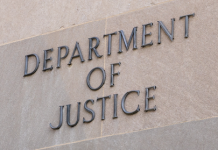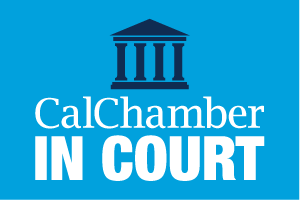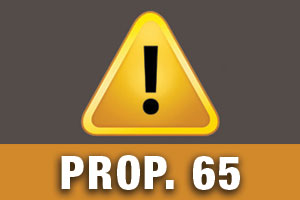The state Department of Justice (DOJ) has proposed amendments that would affect settlement terms, for enforcement actions filed by private parties under Proposition 65.
First, the DOJ proposes to eliminate the regulatory presumption that product reformulation in and of itself is always appropriate for purposes of a settlement agreement. Instead, the DOJ would require evidence to be provided showing that the product at issue in the enforcement action had in fact exposed consumers to a Prop 65-listed chemical at unlawful amounts. Second, the DOJ proposes to require that payments-in-lieu of penalties, also referred to as Additional Settlement Payments (ASPs), should not exceed the amount of any non-contingent penalty.
The California Chamber of Commerce is leading a coalition of nearly 200 California-based and national organizations and businesses of varying sizes that, collectedly, represent nearly every major business sector on which the DOJ-proposed amendments would have a direct impact.
Proposition 65, Private Right of Action
Proposition 65 contains a private right of action provision, which allows private persons or organizations to bring actions against alleged violators of Proposition 65 “in the public interest.”
Over the years, there has been a dramatic increase in the number of private attorneys who make their living going business to business and threatening to sue, often based on tenuous allegations. In fact, allegations need not contain any demonstrable merit whatsoever in order for private enforcers to benefit financially under the law. This is because private enforcers and businesses alike understand that businesses will almost always settle even the most egregious and unfounded claims because the sheer cost of prolonged litigation will far exceed settlement demands. Prop 65 litigation abuse is well-documented. Indeed, in 2014, there were 663 in-court settlements totaling $29.4 million; of that total, a staggering three-fourths went directly in the pockets of plaintiff attorneys.
The CalChamber supports the underlying intent of Proposition 65, which is to ensure that consumers can make reasoned and informed choices when they purchase consumer products or enter certain establishments. Unfortunately, the intent of Proposition 65 has been undermined by ever-increasing attempts to use the law solely for personal profit.
Coalition Comments
The coalition supports and appreciates the DOJ’s stated objectives of constraining private parties’ use of payments-in-lieu-of penalties, increasing transparency and accountability in private settlements, and reducing excessive attorney’s fee awards.
The coalition also agrees with the DOJ’s position that increased scrutiny of the merits of private enforcers’ claims are needed to curb unnecessary lawsuits that do not promote the public interest. The AG’s efforts are a welcome step forward, especially in light of the recent regulatory and pre-regulatory proposals of the Office of Environmental Health Hazard Assessment (OEHHA) that the coalition believes will substantially worsen the already-problematic litigation climate under Proposition 65.
The coalition is concerned, however, that key aspects of the DOJ proposal—specifically the components on reformulation and ASPs—will fall short of the department’s stated objectives and, worse, may increase businesses’ costs in resolving private enforcement claims.
Finally the coalition requests that the DOJ examine the economic impact of this proposal on the regulated community.
Rebuttable Presumption of “Significant Public Benefit” for Reformulation
One amendment would create a rebuttable presumption that changes in a settling defendant’s practices that reduce or eliminate the exposure to a listed chemical are presumed to confer a “significant public benefit” justifying an award of fees to the settling plaintiff. In order to establish this presumption, supporting evidence must show that the product at issue either is or was at one time exposing consumers to Prop 65-listed chemicals at unlawful levels and the product as reformulated would no longer do so. By way of contrast, today, product reformulation is deemed sufficient to confer a “significant public benefit” even if no unlawful exposures had ever occurred.
This proposal is intended to curb private enforcements whose settlement outcome confers little public benefit. Specifically, the underlying concern is that, today, many businesses agree to reformulate their products to settle a case even if their products had never even exposed consumers at unlawful levels.
The proposed amendment, although well-intended, is currently drafted in a way that has the potential to increase the costs of, and to disrupt, the settlement process in the private enforcement proceedings, when both parties are equally invested in ensuring that the settlement is finalized.
The proposal raises the risk that private enforcers, as part of negotiations, will ensure that all of their fees and costs will be covered in the event that additional, high-cost evidence, such as exposure assessments, must be generated to respond to inquiries from the Attorney General or a court. Thus, settling defendants may be put in the untenable position of having to justify the terms of the settlement—at their own expense—by undertaking precisely the same costly exercise that they hoped to avoid in the first place. Stated simply, the increased scrutiny that the DOJ is proposing, while plausible from a substantive standpoint, comes too late in the process when the parties simply want to settle the case and move on.
If the DOJ proceeds with this proposal, the risk of this inadvertent outcome may be reduced if it and/or the Final Statement of Reasons clarify that an exposure assessment is not necessarily required to support a finding of significant public benefit, and that other forms of evidence may establish it. Beyond this, the DOJ’s goal and the public interest would be best served by imposing increased scrutiny early in the private enforcement process, and requiring plaintiffs at the 60-day notice stage, with their Certificate of Merit, to provide some degree of evidentiary support that use of a product presents a level of exposure likely to exceed the relevant warning level. This “up-front” approach would be more likely to deter private enforcers from pursuing unnecessary actions in the first place, since they would have no opportunity to later shift the burden of generating the necessary evidence to the settling company in the context of settlement negotiations.
Additional Settlement Payments
Another amendment would require that payments-in-lieu of penalties, also referred to as “Additional Settlement Payments” (ASPs), should not exceed the amount of any noncontingent civil penalty. A “noncontingent”civil penalty is one that must be paid by the business irrespective of what additional actions that entity may take; a “contingent” civil penalty is one that may be waived if the business undertakes additional, specified actions under the settlement.
ASPs have been components of Proposition 65 settlements for many years. These payments are not specifically authorized by Proposition 65 and are not subject to the statutory allocation of 25% to the named plaintiff and 75% to OEHHA, since they are not civil penalties subject to that allocation. Accordingly, a fairly significant amount of settlement payments are not allocated to OEHHA to support its Proposition 65 implementation duties. Further, settlements containing these payments frequently are vague about the purpose to which they will be put, and/or what third party guarantees may receive these funds, and for what purpose.
The previsions proposed by the DOJ are an attempt to enhance transparency and accountability in ASPs and ensure that those payments further the intent of the law.
The coalition believes that the best and most effective course of action for the DOJ to take at this time would be to prohibit ASPs in any Proposition 65 settlement, whether court-approved or out-of-court. If the DOJ elects to continue allowing ASPs in Proposition 65 settlements, the proposal should be reviewed to require private enforcers receiving ASPs to demonstrate, as a threshold matter, why they are necessary and in the public interest given the availability of statutory penalties.
Economic Impact Analysis
The DOJ Economic Impact Statement (EIS) focuses solely on the economic impacts to the private enforcement community. Specifically, in describing the types of businesses that will be affected by the proposal, the EIS notes that the proposal will exclusively impact “nonprofit corporations and consumer and environmental groups that receive funding through [Additional Settlement Payments] ASPs.”
The coalition believes that there may well be impacts on the regulated community as well as the private enforcement community adjust to these new rules. The EIS should address these potential impacts.
Next Steps
The deadline to submit comments was November 9, 2015. The Attorney General is currently reviewing public comments. Once all comments are reviewed, the Attorney General may release a revised proposal for public review and comment, assuming the revisions are substantial. Alternatively, if the proposal is unchanged or only slightly revised, the Attorney General may move forward and adopt a final rule without circulating another draft for public review and comment.
Staff Contact: Anthony Samson


